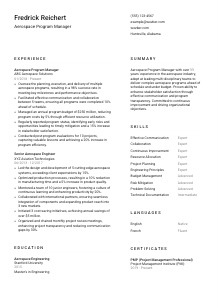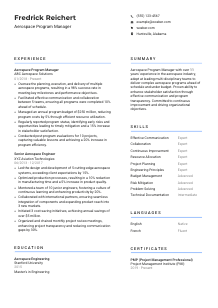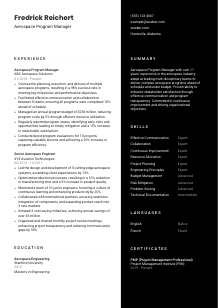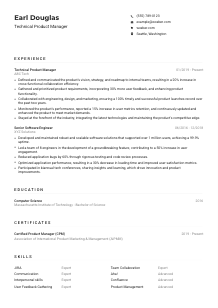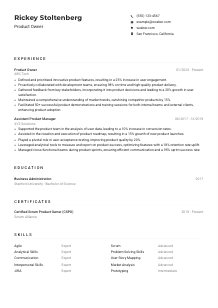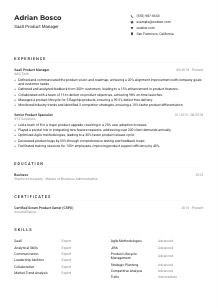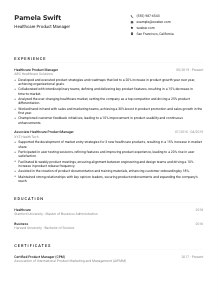Aerospace Program Manager Resume Example
Orchestrating aerospace missions, but your resume isn't getting launched into interviews? Navigate this Aerospace Program Manager resume example, fashioned with Wozber free resume builder. Realize how you can fuse your program leadership with job requirements, ensuring your career trajectory aligns with the next cosmic exploration!
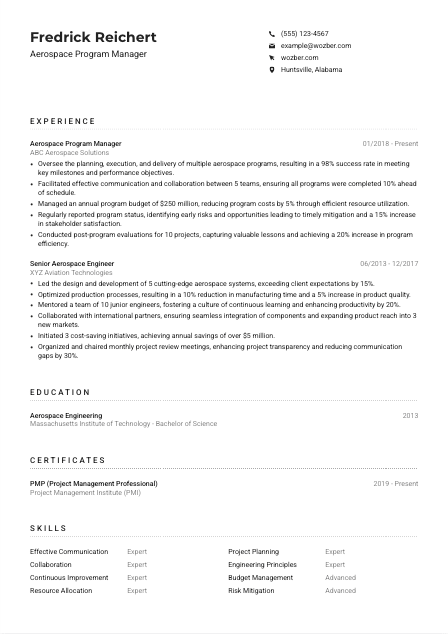
How to write an Aerospace Program Manager Resume?
Hello, visionary Aerospace Program Manager! If you're aiming to propel your career to new heights within the aerospace industry, your resume is your launchpad. Using the cutting-edge Wozber free resume builder, we'll guide you through creating an ATS-compliant resume that not only meets but exceeds the expectations of hiring managers. From aligning with the job description to optimizing for Applicant Tracking Systems (ATS), this article is your mission briefing for crafting a resume that lands you the Aerospace Program Manager position.
Ready for takeoff? Let's plot the course to your career success.
Personal Details
The Personal Details section is more than just your contact information—it's your beacon in the vast aerospace industry, guiding hiring managers to you. Let's navigate the specifics for an Aerospace Program Manager's resume, ensuring precision alignment with the profession's requisites.
1. Highlight Your Name
Think of your name as the flag on your spacecraft; it must be visible and bold. Use a font that's professional and slightly larger than the rest of your document to ensure it stands out.
2. Declare Your Mission
Just below your name, proudly state your profession as 'Aerospace Program Manager.' This immediately signals your career focus to anyone reading your resume.
3. Mission Control Contact
- Phone Number: Ensure your number is correct; a misplaced digit can mean a lost opportunity.
- Professional Email Address: Use a professional format (firstname.lastname@email.com) to maintain a polished image.
4. Ground Operations Location
Given the job requirement for a candidate located in Huntsville, Alabama, clearly stating your city and state confirms your eligibility, showing you're ready for immediate deployment without the need for relocation.
5. Additional Frequencies
Inclusion of a LinkedIn profile or personal website can offer deeper insights into your professional journey. Just make sure these channels are meticulously updated and reflect the professionalism of your resume.
Takeaway
Your Personal Details section is your first signal boost to potential employers. Ensure it's laser-targeted to the Aerospace Program Manager role, clear, and leaves no room for miscommunication. It's the foundational step in paving your pathway to new career horizons.





Experience
Your experience section is where you prove your capability to pilot complex aerospace programs. Here, precision in detailing your past missions and accomplishments is key. Let's ensure your trajectory is aligned with the role of an Aerospace Program Manager.
- Oversee the planning, execution, and delivery of multiple aerospace programs, resulting in a 98% success rate in meeting key milestones and performance objectives.
- Facilitated effective communication and collaboration between 5 teams, ensuring all programs were completed 10% ahead of schedule.
- Managed an annual program budget of $250 million, reducing program costs by 5% through efficient resource utilization.
- Regularly reported program status, identifying early risks and opportunities leading to timely mitigation and a 15% increase in stakeholder satisfaction.
- Conducted post‑program evaluations for 10 projects, capturing valuable lessons and achieving a 20% increase in program efficiency.
- Led the design and development of 5 cutting‑edge aerospace systems, exceeding client expectations by 15%.
- Optimized production processes, resulting in a 10% reduction in manufacturing time and a 5% increase in product quality.
- Mentored a team of 10 junior engineers, fostering a culture of continuous learning and enhancing productivity by 20%.
- Collaborated with international partners, ensuring seamless integration of components and expanding product reach into 3 new markets.
- Initiated 3 cost‑saving initiatives, achieving annual savings of over $5 million.
- Organized and chaired monthly project review meetings, enhancing project transparency and reducing communication gaps by 30%.
1. Identifying Missions
First, segregate your experience into missions that directly correlate with the job description. Highlight your roles in aerospace program management, focusing on leadership, team collaboration, and successful program delivery.
2. Mission Log
For each mission, include your title, the organization's name, the duration of your service, and, importantly, bullet points describing your accomplishments, mirroring phrases like 'oversee the planning, execution, and delivery of multiple aerospace programs,' as outlined in our example.
3. Mission Accomplishments
Craft actionable achievement statements with quantifiable results. For instance, 'Managed an annual program budget of $250 million, reducing program costs by 5%' demonstrates your strategic impact on financial efficiency.
4. Quantify and Qualify
Incorporate numbers whenever possible to quantify your impact. This could include the number of projects led, percentages in cost reduction, or efficiency improvements. Numbers tell a compelling story of success.
5. Relevance is Key
Focus on detailing experiences that resonate with the role's responsibilities. Extraneous achievements, though commendable, can distract from your core qualifications for the Aerospace Program Manager position.
Takeaway
Your experience section is your track record of successful missions. It should echo the requirements of the Aerospace Program Manager role, showcasing your leadership, financial acumen, and project delivery capabilities. Tailor it to reflect your most relevant and significant accomplishments, propelling your resume to the top of the stack.
Education
The academic background for an Aerospace Program Manager must not just satisfy the basics but should thrust your qualifications into the limelight. Let's navigate how to structure your education to highlight its relevance and depth for this role.
1. Identifying Core Modules
Align your academic qualifications with the job's requirements. For instance, 'Bachelor's degree in Aerospace Engineering or a related technical field' directly responds to the requisites listed in the job posting.
2. Rocket Structure
Present your degrees in a clear, concise format. List your degree, the major, the institution, and your graduation year, spotlighting your 'Bachelor of Science in Aerospace Engineering,' as demonstrated in our resume example.
3. Trajectory Matching
If the job emphasizes a particular educational background, make sure yours is up front and center. In this case, emphasizing a Master's in Aerospace Engineering further solidifies your fit for the role.
4. Specialized Training
Including relevant coursework, projects, or thesis work showcases your deeper engagement and specialized knowledge within the aerospace field, adding more thrust to your candidature.
5. Stellar Achievements
Graduating with honors, memberships in aerospace clubs, or any accolades relevant to the field can add credibility to your resume. Highlight these achievements, ensuring they complement the narrative of your professional prowess.
Takeaway
Every segment of your education should construct a narrative of thorough preparation and specialization in the aerospace sector. Whether it's your degrees, courses, or extracurricular engagements, ensure they collectively elevate your candidacy for the Aerospace Program Manager role.
Certificates
In the aerospace industry, certifications can often serve as the badge of honor that distinguishes you from other candidates. Let's tailor your certificates section with a laser focus, underlining your continuous commitment to professional development.
1. Highlight Required Certifications
Match your certifications with the job's needs, prominently featuring any that are explicitly requested. The 'PMP (Project Management Professional)' certification, as specified in our example, immediately validates your expertise.
2. Relevant Certifications
List certifications that are directly pertinent to the role. This doesn't mean listing every certificate you've earned; instead, spotlight those that showcase your leadership and program management competencies.
3. Date of Achievement
If your certification has a duration or is particularly recent, include the date range. This underscores your up-to-date knowledge and ongoing commitment to your professional growth.
4. Continuous Learning Trajectory
The aerospace industry is ever-evolving, and so should your certifications. Stay proactive about acquiring new credentials that enhance your qualifications and keep you on the cutting edge of aerospace program management.
Takeaway
Your certifications are akin to your professional toolkit's special equipment; they prepare you for the unique challenges and requirements of the Aerospace Program Manager role. Curate this section to highlight those credentials that align with the job's demands, showcasing your readiness and commitment.
Skills
The Skills section is your opportunity to showcase the specific competencies that make you the ideal candidate for the Aerospace Program Manager position. Here, we'll focus on aligning your skills with the mission-critical requirements of the role.
1. Skillset Analysis
Dive into the job description and identify both the explicit and implicit skills required. Skills such as 'Effective Communication,' 'Collaboration,' and 'Budget Management' directly respond to the demands outlined.
2. Mission-Critical Skills
Prioritize listing skills that are directly applicable to the Aerospace Program Manager role. Even if you possess a wide array of skills, spotlighting those like 'Project Planning' or 'Risk Mitigation' makes your resume more compelling.
3. Skill Configuration
Organize your skills in a way that makes them easy to identify and digest. Consider categorizing them into 'hard' and 'soft' skills, or ranking them in order of relevance to the Aerospace Program Manager position.
Takeaway
Think of your skills as the technical specs of a spacecraft; they need to be precisely calibrated to ensure mission success. Curate your skills section with a focus on those competencies that directly align with the Aerospace Program Manager role, presenting yourself as the ideal candidate.
Languages
In the global aerospace industry, linguistic capabilities can be a significant asset, enhancing your ability to communicate with diverse teams and stakeholders. Let's optimize your language section to reflect its value to the Aerospace Program Manager role.
1. Mission Requirements
Begin by identifying any specific language requirements or preferences stated in the job posting. In our example, 'High level English communication skills are a must,' aligns precisely with the job's demands.
2. Primary Communication Channels
List English at the top of your languages section, categorizing your proficiency as 'Native' or 'Fluent' to meet the job's primary requirement.
3. Supplementary Dialects
Even if additional languages aren't specified in the job description, inclusively listing others you speak can showcase your adaptability and global readiness — qualities essential for an Aerospace Program Manager.
4. Linguistic Proficiency
Be transparent about your level of proficiency in each language, using terms like 'Native,' 'Fluent,' 'Intermediate,' or 'Basic.' This clarity helps set realistic expectations for your linguistic capabilities.
5. Global Mission Readiness
Given the international scope of aerospace projects, your multilingual skills might just be the unique advantage that sets you apart, especially if the role involves coordination with global teams or stakeholders.
Takeaway
Your linguistic skills are not just personal attributes; they're tools that enhance your ability to lead, communicate, and collaborate on a global scale. Highlighting your proficiency in multiple languages on your resume can significantly strengthen your candidacy for the Aerospace Program Manager role.
Summary
Your resume summary serves as the executive summary of your professional journey—a concise capsule that encapsulates your essence as an Aerospace Program Manager. Crafting a compelling narrative here is critical to capturing the attention of hiring managers.
1. Capture the Essence
Begin with a broad statement that introduces you as a professional. For instance, 'Aerospace Program Manager with over 11 years' experience...' sets the stage for detailing your expertise in the field.
2. Mission Highlights
Select key achievements and skills that directly relate to the job requirements and weave them into your summary. These should reflect your capacity to lead and deliver complex aerospace programs efficiently.
3. Precision and Brevity
Keep your summary tight and impactful. Aim for a balance between informing the reader of your core competencies and retaining their interest to dive deeper into your resume.
4. Launchpad Readiness
Conclude with a statement that signals your readiness to contribute to the organization, such as a commitment to driving continuous improvement and stakeholder satisfaction.
Takeaway
The summary section is your opening salvo, the first impression you make on the hiring manager. It's your opportunity to underscore your suitability for the Aerospace Program Manager role, highlighting your experience, skills, and the unique value you bring to the table. Craft it with care to ensure your resume stands out from the competition.
Your Journey to the Stars Begins Now
Congratulations on completing your guided mission to create an Aerospace Program Manager resume that's both attention-grabbing and ATS-compliant. By following these steps using the Wozber free resume builder, including its ATS-friendly resume templates and ATS resume scanner, you've crafted a document that speaks directly to the needs of hiring managers in the aerospace sector. Your journey doesn't end here; it's just the beginning. With your resume as your navigation tool, you're now ready to explore new professional galaxies.
May your career trajectory soar to new heights. The sky is not the limit—it's just the beginning.

- Bachelor's degree in Aerospace Engineering or a related technical field.
- Minimum of 8 years of experience in the aerospace industry, with at least 3 years in a program management capacity.
- Proven track record of leading multi-disciplinary teams and delivering complex aerospace programs on time and within budget.
- Exceptional communication and interpersonal skills with the ability to interface with all levels of the organization, as well as with external stakeholders and customers.
- PMP (Project Management Professional) certification or equivalent.
- High level English communication skills are a must.
- Must be located in Huntsville, Alabama.
- Oversee the planning, execution, and delivery of multiple aerospace programs, ensuring all key milestones and performance objectives are met.
- Facilitate effective communication and collaboration between all teams involved in the program, including design, engineering, manufacturing, and procurement.
- Manage program budgets and resources, ensuring optimal utilization and making allocation decisions as necessary.
- Regularly report program status, risks, and opportunities to senior management and stakeholders.
- Conduct post-program evaluations to ensure continuous improvement and capture lessons learned for future programs.





